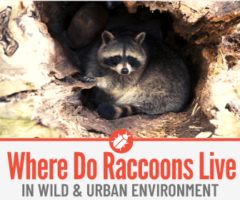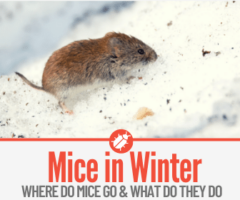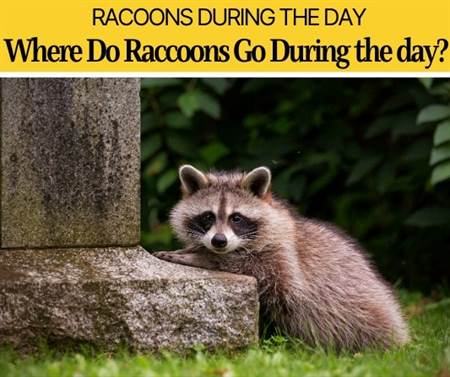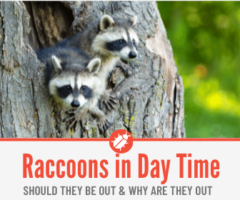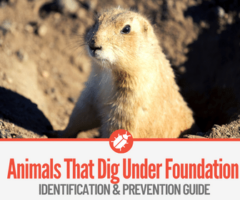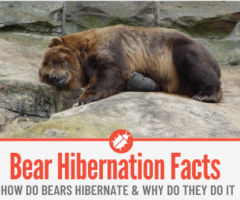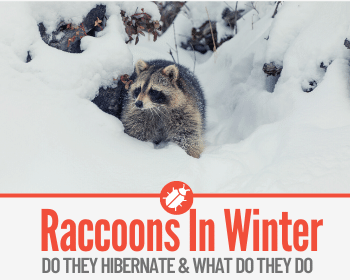 Have you ever wondered what torpor is, or why you still see raccoons out in winter, instead of being tucked up tight in tunnels and burrows?
Have you ever wondered what torpor is, or why you still see raccoons out in winter, instead of being tucked up tight in tunnels and burrows?
This article will guide you through raccoon winter habits and how they equip themselves for the cold weather.
You will also learn what they feast on during winter and what you can offer them to keep them warm.
Do Raccoons Hibernate?
Raccoons don’t hibernate in the typical sense of the definition that you may be familiar with.
But they do somewhat ‘hibernate.’ They actually build dens, in which they are able to sleep during long stretches of time during the coldest days.
They are also able to sleep for up to a month in a period of long inactivity known as a ‘torpor.’
Raccoons aren’t able to hibernate for the full duration of winter as their bodies are not built for it.
This means Raccoons hibernate for the coldest days and break out on warmer days in search of food.
Raccoons enter torpor usually in winter, when it becomes bitterly cold and the average outside temperature has dropped below fifteen degrees Fahrenheit.
They will sleep more often and for longer stretches of time during periods that are colder and then they will remerge on warmer days, on the prowl for food.
Although raccoons are solitary, they spend the cold winter nights cuddled up with their families.
Sometimes they also club together with other raccoon families or other nesting animals to achieve the largest benefit of body warmth possible, throughout the coldest days.
They have also been known to steel other animals’ hibernation dens if they are desperate enough.
Raccoon Hibernation Period
If you are wondering how long does their hibernation period last, Unlike many hibernating animals, raccoons cannot withstand the whole of the winter duration in hibernation.
They do stock up on food before torpor commences, however it is not sufficient enough to last them the whole Winter, forcing them to forage in the warmer days.
For this reason, torpor tends to last up to a month.
But it can be anywhere from one day to a few consecutive days or up to the entire month.
Raccoons can not last the winter in hibernation as their bodies are not built for it.
In torpor their body temperature lowers and increases insulin production to lower the energy needed to survive by decreasing blood sugars.
This means that they do have to go out on warmer days to rebuild some of the blood sugars.
So, the colder the state, the longer the raccoon hibernation may last and if it is warm enough raccoons may not even enter torpor.
How Long do Raccoons Sleep in Winter?
Raccoons in winter can sleep from anywhere from a day to an entire month.
Of course, they won’t be asleep for the entire duration of that time as they will have to get up on occasion and forage for food to keep their fat stores adequately stocked.
Some raccoons won’t sleep during the winter as they don’t enter a state of torpor unless the weather is bitterly cold.
Therefore, the length of time that sleep lasts can be very different from raccoon to raccoon.
Raccoon Adaptation During Winter
Before entering their torpor, they must increase their fat stores.
This means eating as much as they can – raccoons will have shed up to 50% of their body weight by the end of torpor.
They then grow a thicker coat of fur to insulate them during the cold of the winter.
This acts similarly to a sleeping bag; in that it traps body heat close to their skin.
They can grow thicker coats depending on the severity of the winter.
The fat builds most heavily in the tail, which they can wrap around themselves in the cold.
Raccoons prepare for winter during the summer months, starting to build the fat stores from then ready for the colder months.
They then shed the weight throughout the winter using it as energy during torpor.
Surviving the Winter
Most animals that hibernate do it because food is scarce, however raccoons are intelligent and have great adaptability.
The fact that raccoons eat almost anything allows them not to hibernate for as long and easily survive any winter.
As long as humans consume during the wintertime so can they!
This is how they are able to survive the winter and grow thick fur, by foraging and taking from your trash cans.
Warm dens and body heat from other raccoons also help them survive the winter, giving them extra warmth.
Staying Warm in Winter
Aside from filling up on food to increase their fat stores, and growing their fur out thicker, they also seek out warm dens to stay warm in the winter.
Raccoons are fond of hollow trees for shelter but have also been known to be opportunistic and will make dens in abandoned buildings, caves and will sometimes make underground burrows.
In severe cold weather they have also been known to share burrows with other raccoons to benefit from mutual body warmth.
What Do Raccoons do in the Winter?
They are either in torpor or looking for somewhere to inhabit for it in caves, trees, burrows or abandoned buildings.
They prepare for this by getting and stocking up on lots of food.
Some raccoons remain in their normal routine.
Many people may panic if they encounter a raccoon during the daytime however, but during the winter this can be just as common as they are searching for food.
The nights are also too cold for them to withstand, despite their nocturnal habits. This is why you might see them out during the day.
If you are in warmer states however, you will probably see them up to their usual antics even during the winter.
Where Do Raccoons live in Winter?
They will take anywhere warm, including your attic or maybe even your chimney.
They could be in one of their dens, in hollowed trees or free buildings, somewhere sheltered and warm.
Sometimes they have also been known to reside in rock crevasses.
Raccoons may also eject other animals from their nests and take them over.
They also go foraging a lot for food as they have to increase their fat stores and grow their fur thicker, especially on their tails.
Raccoons need to keep a constant stream of food as they aren’t built for hibernating the entire winter.
Mother raccoons will also forage much more frequently to feed their babies who will also nest with them.
Check your attics and neglected sheds because they could be hiding up there and nibbling on your insulation as well!
They will also take over, sheds, trees, homes and caves.
They will even take over already occupied nests, kicking out animals who are already in the midst of their own hibernation such as squirrels or rabbits.
Sometimes raccoons are even known to raid squirrel nests.
But they will live or nest anywhere they possibly can that is sheltered and warm as well as quiet and in close proximity to food.
What do Raccoons Eat in the Winter?
During torpor in winter they mostly live off their fat stores, which are left over from summer.
When food is scarce during the winter, they live off acorns, corn, fruit, insects, injured waterfowl and other small animals.
This is because these foods are still available to forage during the cold as nature is still producing them.
As all year round, they are opportunistic and will take whatever is available like left-over littered pizza or cruelly crushed chips.
In warmer months raccoons will eat small insects, frogs, eggs or crayfish.
They will be known to leave their nests on warmer days to search for any food and enter the nests of smaller animals for food to pounce on them whilst they’re sleeping, such as squirrels.
Any mother raccoons will also be out for food much more often than any other raccoons as they also have babies to feed.
They will however never reject your left-over trash!
During the winter they do eat less food and hunt less. They are in scavenger mode searching for any food available.
Preparing for winter, they grow in size and weight in order to increase the fat stores for winter.
They are always on the lookout for food during the winter but food is generally scarce and so they may eat less, simply because there is less on offer.
What can you Feed a raccoon During the Winter?
Raccoons will take anything at all that is on offer to them.
Foods that are known to be rich in protein are particularly good for Raccoons, such as fruit, nuts, turkey and peanut butter.
Raccoons are also partial to any pet foods such as dog or cat food.
However, it would not be encouraged or recommended to feed any wild raccoons that you may see, not just during the winter but through all seasons.
This is because they are particularly intelligent creatures and will quickly associate you with food.
In turn, this will encourage Raccoons to keep coming back and even become your pet , which you want to aim to avoid as they are diseased, and their excrement can also be very harmful.
But they aren’t fussy, and they will love anything at all!
Raccoon Reproduction During the Winter
They tend to mate in late winter, giving birth in warmer months, April and May.
Sometimes the Raccoon couples will be in torpor together.
The young males which are born also hibernate with their mothers during the cold months of winter.
Winter is the ideal time for them to mate as this is when they spend the most time together in close proximity.
Raccoons are typically solitary animals and so torpor may be the only time that couples are around each other enough to mate.
If you are wondering if raccoons give birth during winter…
They typically mate in winter, so giving birth can be very uncommon in winter however, depending on the winter patterns, babies can be born as early as march however, which can be a fairly cold month.
How Cold is too Cold for Raccoons?
Well below 15 degrees Fahrenheit will force them into torpor due to the fact that they need to remain warm.
Cold nights in winter can also be too cold for them which may cause you to see them during the daytime instead of their regular activity during the night.
Despite the bitter cold you may still see them around as they do need to forage for food in between nesting to keep their fat stores up and their fur thicker.
They are fine throughout the winter however, as they are able to keep warm from their thick winter coats.
What to do About Raccoons in your Yard in Winter.
Pest control should be called if you want to get rid of raccoons for good in winter, do not be tempted to try and take matters into personal hands as raccoons can be particularly aggressive, especially if they are rabid.
If you want to prevent and deter them initially from entering your yard or general property, there is a few things you can do.
Don’t leave any food out such as disposable barbeques or any scraps.
Also make sure your trash cans are securely sealed, as this will stop them from being attracted initially, as they are only interested in finding food.
You can also make sure there are no entrances to the yard via holes in the fencing which will keep them out.
Playing music on a radio may also deter them as well as ammonia-soaked rags or mothballs can keep raccoons away.
Since Raccoons like nesting and living in hollowed out trees or abandoned sheds and buildings, also make sure they are secure, if you own any.
Block the hollowed trees so they can’t get in but make sure to check they aren’t in there already before you do block it up!
Are Racoons Known to enter Homes during the Winter?
Sometimes they have been known to nest in attics during the winter, but also just in general.
Raccoons are very smart and opportunistic animals, so if they can nest quietly in your house somewhere ideal, like the attic or garage they will as they are seeking out anywhere warm and quiet.
Raccoons can also be very brutal and take over the nests of any animals that might have snuck their way into your attic or garage before them.
I’ve never seen them wander straight through the door on purpose however!
Take preventive measures or call pest control if you happen to have them nesting, but they’re probably after somewhere quieter and closer to food than your house.

